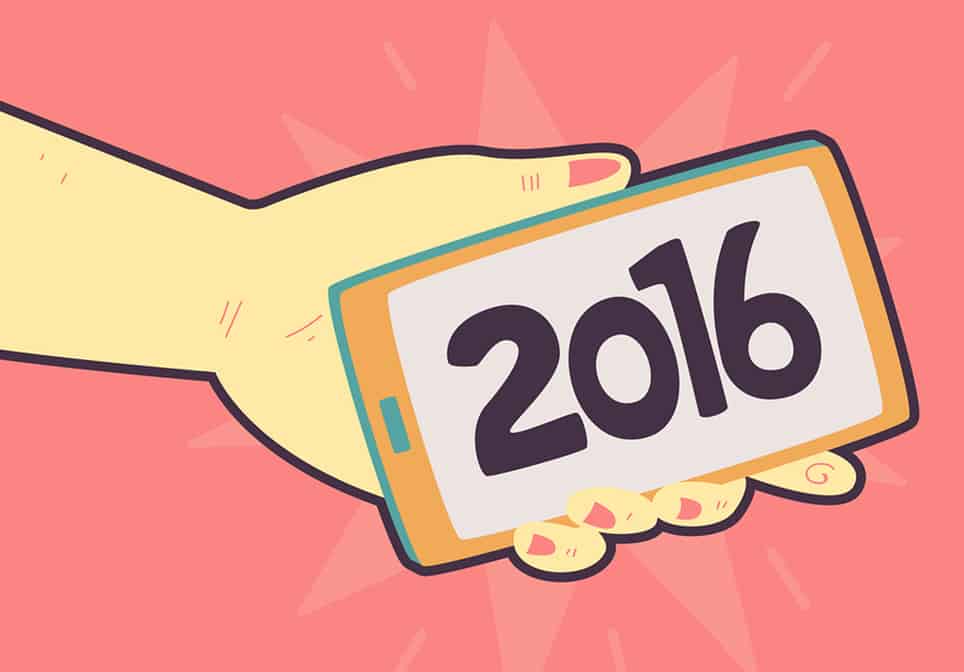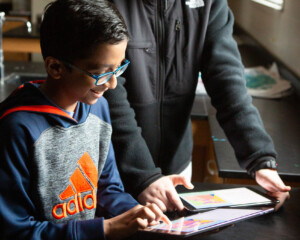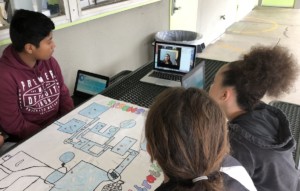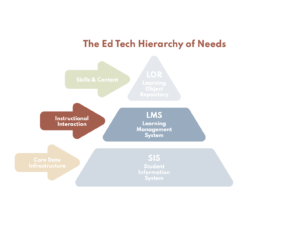What’s on the Horizon for EdTech & Education in 2016

With the new year just around the corner we’ve been looking back at trends with a short #YearInReview series. 2015 was the end of an era of standards-based reform while #MakerEd was on the rise; it was year of the mobile (finally) and it was the year when we followed the rise of Chromebooks and machine learning. We saw 10 forms of crowdsourcing at work in education. This year we also highlighted over 1,500 smart people doing innovative work as part of the 3rd Annual Smart Lists.
So what does 2016 have in store for innovations in learning? We asked learning leaders what they see on the horizon, and what they hope will change for learners:
As new state and Common Core assessment results are released and gaps in curriculum are identified, there will be a growing and critical need for schools to focus on interventions that efficiently address areas in need of improvement. Effective, technology-enabled interventions will help address issues of student equity by allowing teachers to accelerate learning to meet the needs of all.
~ Aurora Martinez, Executive Director, Curriculum Associates
To provide a comprehensive overview of student achievement, districts, schools and teachers must focus on creating and utilizing a holistic system of assessments, one which balances diagnostic and mastery measures. By using this type of system, educators are provided with a wealth of student data to form instructional groups and differentiate and personalize learning and, in turn, improve student outcomes.
~ Kenneth Tam, Executive Director of Personalized Learning, Curriculum Associates
Now that the educational pendulum has swung back to the states, the environment is ripe for educational reform. Personalizing education will continue to accelerate and a reformation of what students do at school, what teachers do at school and how teachers are prepared for functioning in this environment will continue to evolve. As the number of digital natives begin to become the majority in this new environment ways of “doing school” continue to emerge and seed themselves as the new normal.
~ Tim Hilborn, Chief Instructional Officer, META Solutions
Education Reimagined sees 2016 as a turning point in the learner-centered education movement. We see more and more actors—educators, learners, parents, business and union leaders, policy makers, and community members—joining together in inventive collaborations. They are dramatically expanding the number of places that are putting learners at the center and challenging our traditional notions of when, where, how, with whom, and by whom learning happens. And, thanks to the passage of the ESSA, growing numbers of states will be inquiring into how some states are already effectively empowering pioneers. The time is now; the moment has arrived. Onward!
~ Kelly Young, Director, Education Reimagined
In 2015 I have witnessed that the tide is shifting quickly towards more authentic approaches for knowledge acquisition and application in the educational system. Teachers are able to utilize instantly available data to plan instructional approaches, provide more personalization to learning, gain a better understanding of student need, and then correlate those needs with student interests to optimize learning outcomes. Administrators are gaining the understanding that they must provide the proper environments (physical, virtual, and social) that will leverage learning as a reciprocal experience vs. something that is simply available and provided to students. Administrators, teachers, students and the community are making connections for learning opportunities and community needs. I envision that in 2016 schools will begin a transition into organically designed learning systems that reach beyond their brick and mortar and into their local and global communities to maximizing growth and capitalized on opportunity for our current youth.
~ Lori Vandeborne, Professional Development Specialist, META Solutions (see feature on Lori’s coaching in Marion City Schools)
Competency will be the focus of the conversation in 2016, and yet state policy is completely misaligned conceptually and practically. Unfortunately, because it is an election year, policy may continue to trump student progress.
I hope the promise of personalization may finally be delivered through technology.
~ Julie Young, CEO, Global Personalized Academics
As more districts and states across the country put in place the enablers for implementation of blended learning at scale (connectivity, devices, support for teachers, etc.), the top priority for the ecosystem will shift to clarifying exactly how teaching and learning change in the classroom: how exactly do the student, the teacher, the software, and the data interact to transform learning? Making competency-based learning a reality will be the key focus of this work.
I hope in 2016 that more teachers and principals take on the challenge of implementing innovative new solutions that are still being improved and perfected; this is critical for ongoing innovation! And I hope the sector overall will be patient in measuring the impact of blended learning–we need to wait until we are crystal clear about what the “it” is before we start measuring “whether it works.”
~ Scott Ellis, CEO, The Learning Accelerator
As educators evaluate digital curriculum for use in their schools they will become more discriminating and focus on specific outcomes. Questions they will ask include: Was this curriculum designed to meet this need? Has this curriculum been proven to achieve results? Has the efficacy of this curriculum been demonstrated?
~ Cheryl Vedoe, CEO Apex Learning
I predict that on school visits and meetings with school leaders, more parents will ask whether students engage in Project Based Learning (PBL). PBL will become more expected as an essential element of an excellent education like arts, music, and challenging courses like Advanced Placement.
~ Bob Lenz, Buck Institute for Education
My 2016 predictions are blatant “wishes” for both discourse and action. I predict that 2016 will be seen as the turning point in re-thinking the educational arms race that has pitted parents, school boards, teachers and policy makers against each other, all in the name of preparing students for college and career. I’m talking about communities pushing back, causing us to re-examine our obsession on getting into elite colleges; to address the opportunity gap that perpetuates poverty and robs our youth of hope for a better future; and demanding a higher ed system acknowledge that is too expensive and stuck in 20th Century practices. The strides being made in transformed K-12 school districts throughout the U.S. can, and will, cause the kind of disruption necessary to accelerate innovation.
~ Lydia Dobyns, President & CEO New Tech Network
At Harmony Public Schools, we are hopeful that personalized learning will continue to gain more attraction with practice-based, refined implementations of project based learning and data-rich blended environments across K-12. We see competency based approaches on the horizon and more work based learning opportunities for high schoolers formalized thru a badging system similar to micro-credentialing for teachers.
~Burak Yilmaz, Race to the Top District Project Director, Harmony Public Schools
Old Labels Start to Peel: I predict that increasingly easy access to online and blended learning resources in 2016 – and the concomitant rise of interest in competency-based pathways – will cause educators to start asking themselves crazy questions like, “How can we use this credit-recovery model for kids who want to accelerate through their original credits?” and “How can we make sure everyone graduates high school with college experience under their belt?” and “Why do we have grade levels, anyway?”
The Millennial Two-Fer: In 2016, schools will wake up to the fact that the millennial generation is changing education on two planes – as cadres of new teachers who take technology for granted as part of their fun, creative classrooms, and as parents who resist helicoptering but who also reject rigid and prescriptive approaches to education. Schools will need to respond to this confluence with tools and resources that ensure authentic learning experiences are also deep, rigorous and lasting.
~ Mickey Revenaugh, Director New School Models, Pearson ISDD and Co-Founder and EVP,
Connections Education
Districts and schools are focused on engaging students and providing access to quality STEM learning, which will inspire innovative teachers to take the lead in trying out new technology. Online resources such as Pinterest and Thingiverse will expose the applications of 3D printing for students to use in STEM-related projects, but we’ll soon see more collaboration. We’ll see a shift in both teachers and students from using 3D printers to create fun gadgets to using 3D printers as a tool to solve problems.
~ Erich Zeller, Instructional Consulting Manager, MIND Research Institute
The recent passage of the Every Student Succeeds Act of 2015 represents an important new chapter in US education. This development is a great opportunity for all of us to reimagine education and to think and act more intentionally about rich learning instead of narrow testing.
I foresee the end of the road for ‘one-size-fits-all’ and ‘teaching-to-the-test’ education systems as we instead welcome the advent of stronger personalized learning models that will support teachers and empower students in ways that scale for schools and districts of any size and circumstance. These new models will leverage a new class of learning technology that dynamically adapts in real time while enabling each unique student to direct his or her own learning. The high stakes summative era will give way to a more nimble and high impact formative era that will shift our focus to cultivating deep learning and individual growth for all students.
How can this be achieved? My belief is that dynamic, embedded formative assessment, based on real time data enabled by technology, will be a powerful education enabler in 2016. With in-the-moment information, Learning Guardians will have a richer, more complete picture of what an individual learner actually understands. And, just as importantly, Learning Guardians will have access to new insights about how to best guide each and every student toward lifelong success no matter where students live or where students are in their learning journey.
~ Jessie Woolley-Wilson, President, CEO & Chairman of the Board, DreamBox Learning
In 2016, I predict that online learning will hit the mainstream as K-12 education systems leverage technology to increase access to educational opportunities and seek improved equity. Blended learning continues to dramatically change instructional models by providing real-time, data-driven instruction and opening up multiple pathways for students to learn.
However, the biggest shift will be driven by education systems moving toward personalization for each student’s unique needs, interests, passions and competency-based pathways. New definitions of student success including a broader conceptualization of evidence of student mastery will expand to include project-based learning with student exhibitions and redefining what success looks like at graduation.
This is a turning point in K-12 education in the United States as education leaders explore the implications of a more flexible ESSA for state leadership, district local control and system alignment to set high expectations, close achievement gaps and, importantly, to redefine what it means for a student to be prepared for college, future careers, a living wage in a global economy and effective citizenship by rethinking conceptual frameworks of student achievement and ensuring equity.
~ Susan Patrick, President & CEO, International Association for K-12 Online Learning (iNACOL)
For more, check out:
- (Finally) The Year of Mobile
- 1,500+ Smart People Doing Innovative Work
- Google for the Win: The Ascendence of Chromebooks & Google Apps
Stay in-the-know with all things EdTech and innovations in learning by signing up to receive the weekly Smart Update. This post includes mentions of a Getting Smart partner. For a full list of partners, affiliate organizations and all other disclosures please see our Partner page.







0 Comments
Leave a Comment
Your email address will not be published. All fields are required.